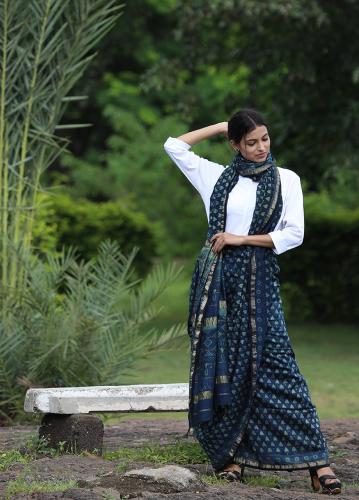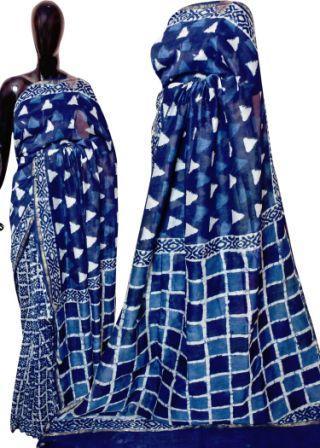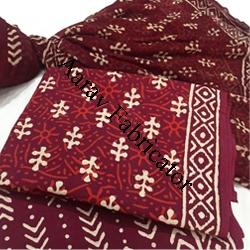Enhance Your Beauty with Designer Bagru Hand Block Printed Saree
Bagru is known place
for naural dyes, indigo dyes and block printing around the world. Bagru has a
unique place textile industry resources. Bagru is situated in geographical 26"
49" 0", north, of Jaipur at national highway.
The art of Bagru Hand Block Printed Saree is an ancient one which is said to have
originated in China. Mud Resist Printing is a special variation, the origin of
which can be traced to about 675 A.D.
Dabu printing is often
grouped together with other Rajasthani hand blocked prints like Sanganeri and
bagru but is in fact quite distinct in fact in terms of its look and method.
The designs are said to be similar to "batik" though techniques to
produce two are quite different.
Know
the Faces Behind the Fabric:
Daboo Printing is
essentially a village handcraft, which is now practiced in many rural areas of
Rajasthan. For many, it has become a family business, with the older generation
passing on the secrets of the craft to the next. These artisans tend to produce
the more traditional and classic varieties of prints which are divisibly
considered the most authentic.
Some
facts about the marketing:
The
Daboo printing process is quite complicated and involves so many workers and
multiple stages of printing, washing, and dyeing to execute the whole process
perfectly. First, the plain weave fabric collected from the mill is carefully
washed to remove any impurities that may interfere with the dyeing process.
Then, using the inserts embedded in the fasst dye, the fabrics are carefully
and carefully designed on the fabric. The next key step is to use the mud.
Style
& Variety:
Daboo printing is used
to create a lot of different designs and patterns. This includes varieties of
colors and motif:
Color
and Dye: Traditional daboo prints are made of natural dyes
such as gray and white (grayish brown) and indigo (blue), as well as yellow and
red from fruit such as pomegranates. Today, more color choices are available
for craftsmen because they are no longer confined to plant dyes and they can
use synthetic dyes. Fabrics can also be dyed more than once, creating double
dabu and triple dabu effects with richer, more colorful look.
Motif
and Design: Typical patterns used are natural
inspiration from peacocks, mangoes, leaves, corn stalks (called boota),
sunflowers (surajmukhi) and animal figures. You can also use geometric shapes,
points and wavy lines. The design so created is repeated over and over the
entire fabric. Occasionally, the mud will crack and leak, causing a unique vein
similar to Batik.
It’s Maintenance:
First
wash the fabric with daboo printed by hand to check the color fastness, which
can then be washed in cold water. It is advisable to dry these fabrics in order
to avoid damaging the brightness of the color. Natural and plant dyes are often
very fast and take a long time to fade, although repeated washing may speed up
the process.
Some
Interesting Facts:
1.
Daboo from
Hindi word "Dabana", meaning "press".
2.
The family of Akola
village, who has been practicing technology, retains the exact formula of the
original mud resistance ("dhabu"), which is a secret guard.
3.
With the
development of many other traditional technologies, Daboo prints almost
instantly before the era of independence, as the influx of cheap printer
printing on the market. The interest of the process with the 21st century, the
resurgence of national textile re-interest.
Bagru
Hand Block Printed Saree can be
used for so many occasions because they have a variety of colors and pattern.
They can be used for a high profile office activity as they are luxurious and
elegant while colorful and fun prints sarees will be used for parties. These
Sarees have been in the tradition of India for many years, and with the design
of this printed saree and the improvement of patterns to suit the young
people's preferences, it is a warm change in fashion and global influence.








Comments